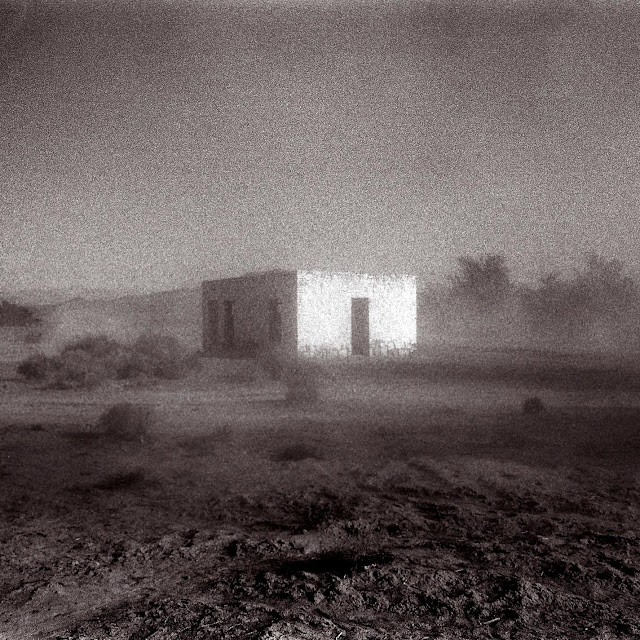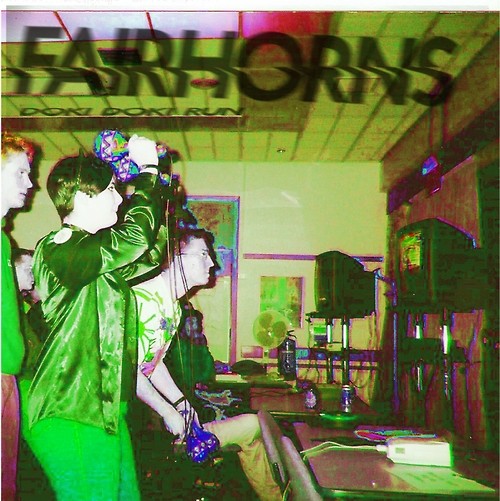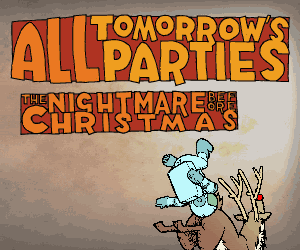
This may be the first ballet I've been to in years, but it's not quite my first experience within the belly of the brutalist leviathan that is the Barbican Centre. It's not even the first of this month. But it's rare that the place is turned out quite so stupendously: the Theatre – the Centre's finest of innumerable spaces – looks resplendent as ever, whilst its audience bears some semblance to a raked amphitheatre with Vivienne Westwood's creative juices allowed to drizzle down from its vertiginous heights. It looks unspeakably, well, as Ana Matronic may say, marvellous.
However to return to the to my mind uncharted creative realm that is le ballet, it's something that I've yet to learn to L.O.V.E or indeed loathe. Tonight may thereby be deemed something of a subjective acid test and, despite being dipped in at the remarkably avant-garde end, the litmus emerges a mad red. For this is unadulterated, and utterly great escapism, and the reasons for this are multifarious.
I've always been endeared to the omni-sensorial experience; the almost alchemic concoction of the visual and the musical. At one point a flamboyantly made-up Jarvis Cocker even dips down into the front few rows to dish out sweets to doting ladies and gentlemen addressed as though cherished pets yet the performance, as a whole, is done in impeccable taste.
The lights still up, a rousing, crackle-addled monologue of black people being "the most beautiful creatures of all" rings out. I think it's OK to avow you'd be unlikely to be greeted with such an introduction down Covent Garden way. The lights do eventually dim, only for one of the Centre's more sizeable screens to emit a bedazzling emerald glow. To Be Young, Gifted and Black subsides, and the faux-raffish The Boom Boom Bap beings. Scritti Politti's White Bread, Black Beer LP of '06 was something of a formative record for me. At seventeen, I was diligently working my way through the Rough Trade Records back catalogue. I'd done Emiliana Torrini's Fisherman's Woman; done new things to Baxter Dury's Floor Show; delighted in Mazzy Star's She Hangs Brightly. Via Rough Trade Shops' Indiepop 1 compilation I'd even learned of the suitably barmy I, Ludicrous' Preposterous Tales – a track I still shove on whenever I'm feeling decidedly London, whatever that may mean. But Green Gartside was of immediate intrigue – a reclusive, self-deprecating creative meritorious of copious column inch operating at a time when the glutinous pages of the NME were crammed with obstreperous and odious post-Libertines pretenders. Heck, a weekly eulogy of the sodding Pretenders themselves would've been inexpressibly preferable. At any rate, White Bread, Black Beer is an album that'll always have a beautiful nostalgia attached to it and that, for me, imbues it with great worth.
It opened my ears to Gartside's ungainly work ethic all those years ago, and yet only tonight does it truly come alive. Against this vivid green, a lifeless body seeps into peripheral vision. First two feet, then two legs, then an abdomen in a sexless tunic. He twirls, involuntarily as wires twist to the infinitely enhanced, and tonight unprecedentedly sensual The Boom Boom Bap. I've little to no grasp of that which follows as Clark's sexually ambiguous, yet discernibly sexy dance troupe perform a series of stark and jolty movements but I'm hooked. Line; sinker: all of the above. Arguably, I'm about as qualified to comment on this particular aspect as I would be at a whisky tasting – I enjoy whisky about as much as I do R.E.M., for the sake of clarity – yet to see these toned athletes of sort perform what seem slo-mo gymnastics is quite riveting. Muscles flex and strain, bulbous veins quite literally pumping iron. This much is visible, even from row K. The green turns to a bluer hue; Gartside's No Fine Lines comes and goes. Clark emerges, flickers a few violent Vs, and promptly disappears. Everything's happening so fast and yet so slow: a selection of to me indescribable hand movements, craned legs, and touchy-feely to the wry sound of Cooking. "Hold my fucking hands", sighs the inevitably absent Politti. Dancers writhe appositely awkwardly to its unorthodox compositional movements as the eight-piece ensemble in-and-out of sight. It's a convoluted seduction; the finest of kinds.
Dancers contorted about each other and Scritti's pieces emotionally contused, the lukewarm flow to Petrococadollar brings some human affection to what is, visually, a quite cold and sterile production. The screen may change its colour with every track, yet it draws from an exclusively wintry palette. And this seems pretty revelatory, primarily as I'd perceived White Bread, Black Beer to perhaps have been frozen back in the past decade. Thus to have its warmth here thawed out gives the impression of the album having endured something of a creative cryogeny so thanks be to Michael Clark for revealing this reality. It has passed the test of time with flying colours far more vibrant than those tonight providing its backdrop, and never did it sound so seminal.
Although it is rather striking how well the LP fits. Gartside's absence is quite so inevitable given his aversion to live performance. His voice is ultimately and, in this context, ideally aloof and opaque anyway. And it's as though his presence is instead reflected in the vibrant green concealed beyond furled curtain, although it's the troupe present and the way in which they interact with sounds recorded oh so long ago that proves most remarkable. They're punctuated by what seem purposefully jarring transitions between each individual dance – every song has its own idiosyncratic routine choreographed accordingly – as Clark's cast only depart some seconds into the segueing movement. It lends a free and fluid effect, and indeed given the brevity of several of the tracks selected, this first half is of the perfect length. It is, with that, perfectly accessible to your average philistine. The piece closes with this eight pulling a series of outré, geometric shapes to silence: devoid of soundtrack, there is but the scuttling of dainty feet onstage and the scribbling of a few pens frantically shadowing their every move off it. And the metallic screen glides shut.
The second piece in this starkly entitled New Work 2012 show (a title that is, in itself, fittingly as though that of an end of year Central Saint Martins exhibition) comprises the very same cast, and of course choreographer yet that's pretty much where all similarities end. With this new segment, we've a new colour scheme. Florid reds dictate, as the scent of passion gradually diffuses. Profusely. Adorned in body suits that make these eight out to look as though they've spent the interval hung from their heels, leading to a rush of blood to the lower abdomen F.E.E.L.I.N.G.C.A.L.L.E.D.L.O.V.E kicks up. Imperiously, Clark's dancers reveal themselves. One by one, they march robotically as though the figures of Gormley's Another Place animated and readied to descend upon the metropolitan boroughs of Merseyside. The track thereby imbued with an otherwise undetectable domesday portent, they're all as gaunt and emaciated as Cocker himself – here lamentably absent – who continues to wait in the wings. A lone female figure is left sprawled out, splayed out on the curve of her belly before her seven co-conspirators return, gyrating wildly and making savage gesticulations evocative of motorik air guitar. As the track concludes and winds down to silence, each cast member performs a frenzied motion, and one completely contrasting to that of his closest contemporary. It's as though a cataloguing of the various reactions one may have to one of Pulp's myriad magna opera. And these few minutes seem to quite succinctly encapsulate the inescapable juxtapositions of life, where love is but a transient byproduct and life itself is nothing if not a counteraction to death. These opposing forces here combat one another as the music assumes the role of life and love, and the dance that of death and seclusion – that most sacred of seclusions whereby one locks the doors tight and never ceases to listen. Different Class was indubitably that sort of record.
But such self-indulgence is to be saved up for another night, for the remainder revolves around Jarvis' fluoro, industro-rawk dabbles with Relaxed Muscle. It's the most apt of monikers in the most sardonic of senses, given that not one solitary muscle relaxes onstage for around an hour. Musically, it's all but entirely incomparable with both Pulp and Scritti Politti, as two pieces commissioned for this particular piece – Jimmy and Joyce – turn acerbic to the point of genuine disturbia. The dancers perform sign lingo to incisive sirens; airport landing gesturing to an ominous tick, all against the corrosive madness of an illogical recurrent idiom reading: 'I'm thinking about starting a zoo.' Unhinging for all involved Relaxed Muscle, at this juncture, take Clark's second New Work down the rabbit hole as the overriding hedonism carries something of an adverse impact. The corporeal throw-around though, that which accompanies this descent into impenetrable glitch and tribalistic pulse, is magnetising as it portrays the human body as an object only animated by the spirit within. I'd never detected such transcendental messaging in dance prior to tonight, rest assured.
Breaking with such lucidity of thought and perception of life though, Relaxed Muscle are at long last unveiled, as the previously tensed and hazy sheet furls. That which now resounds is something like The Knife, and Aphex, and Mount Kimbie, and something all the more malevolent thrown together in cataclysmic disharmony. Clark appears, fiend-like, wielding a mirrored stool. It glimmers, reflecting punctiliously angled spotlights about the Theatre. Bedevilled techno aided by a zombified Jarvis Cocker in fluorescent face paints – pinked beard as standard – is an anomaly rarely, if ever, witnessed; let alone within such a space. Cocker looks demented. He looks fucking brilliant. And, as though leathered Travolta shrieking inconsequential pleas in some purgatorial court of law, or a 3-day Reading Festival nightmare personified his gyratory spin brings the thing to life. The troupe become focal backing dancers; the feel is of the man's beloved BRIT Awards. Again, coincidence intervenes. Jarvis is a smooth mover as it just so happens, and his routine comprises little other than the usual pelvic thrusting and hip snaking. But it does, however, include plenty of moonwalking; the sort one suspects this vivacious corpse-like figure may do over MJ's grave in his native yard.
As was that particular soirée back in '96, Cocker seethes: "This is gonna be a heavy night/ I've seen the future/ And it's not bright" over the guttural barrage of guitar and snares. This is The Heavy, and it's an electrifyingly leaden listen. It sounds like the rudimentary thudding of The Kills and The Jon Spencer Blues Explosion combined, with that combination in turn combined with the boozy groans of Tom Meighan, as the Theatre trembles as only muscles and the odd top lip usually may once within. Cocker merely continues to strut and swagger; the demonic cajoler of a cast now directed by the every audible clack of his Cuban heels. It's as compelling as TOTP once was, and it's as flabbergasting as the show never could've been: there are men made to resemble pencils, unaided by prop; women doing unthinkable things to chairs; Cocker chasing said women about the place with a raggedy, tasselled whip as though a rabid freak with a leash. He's the demon you wish were hidden up every dark Farringdon alley, and I'm left utterly oblivious as to where to look. Cocker may be painted glaring, but you can paint me stunned come this monumental denouement.
Clark, the most sprightly of sprites, appears and as per, expeditiously disappears with each of three rapturously received bows. Was that ballet? In all honesty I'm little, to none the wiser. By virtue of Cocker's presence and his infallible confidence, I'd voice a preference for the latter, and slightly longer half. But either way, on the whole it'd appear as though Clark & co. are really onto something with this dance malarkey...























